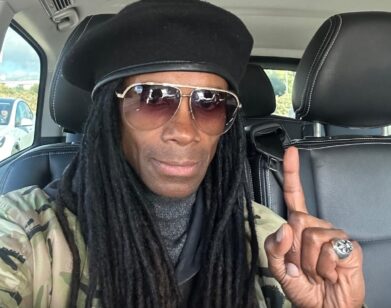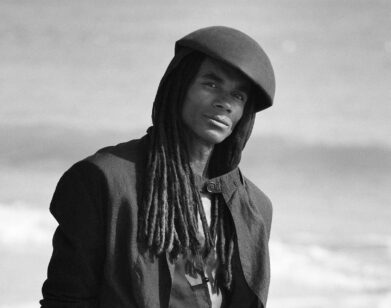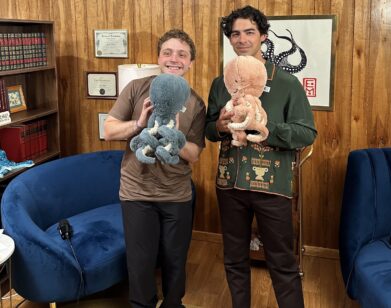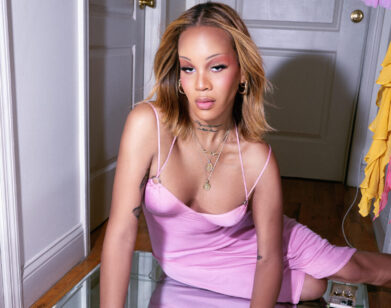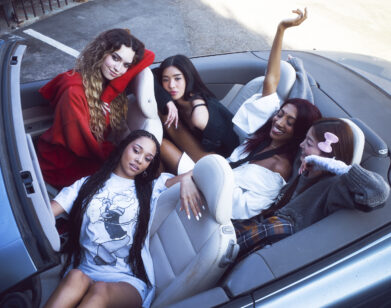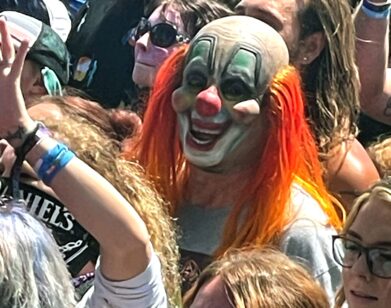The Banhart Family Story
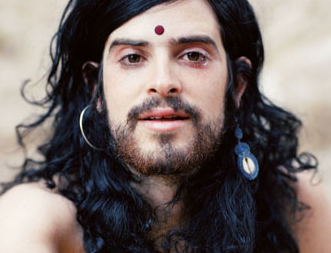
Currituck Co. frontman and sometime Vetiver member Kevin Barker has a wicked sense of humor—his new film, The Family Jams, is named in part after an album released by the Manson Family commune. But the film is also something a lot purer than that: a documentary about Devendra Banhart’s 2004 tour, featuring performances and pow-wows by Banhart, Joanna Newsom, Vetiver, Antony and the Johnsons, Espers, and Meg Baird, among others. Because the project boils down to Barker shooting footage of his friends, he doesn’t have quite the detached eye most documentarians do. In this case that’s a good thing.
When we spoke to Barker, he was in California, en route to the Sarasota Film Festival. The Festival will host the first public screenings of The Family Jams tonight and tomorrow.
AS: So who’s seen the film thus far?
KB: Just friends.
AS: How has the response been among people you know?
KB: It’s been really good. I’ve showed it to a lot of friends whose opinions I trust and gotten notes from people. It’s gone through a number of cuts, stuff like that. A number of revisions.
AS: Did you always intend to release this as a full-length movie?
KB: I told Devendra that I thought a tour documentary about him would be a good movie, and that was like six months before that tour happened. When the tour came, he just invited me along with a camera. And I didn’t really have any particular ambitions about it, except to make a movie out of it, to see what I could do. I’ve never made a documentary before.
AS: Do you think of yourself as primarily a musician or a filmmaker? Did you stumble into one through the other?
KB: I guess I’m both. I’ve been a musician for the last ten years, but I went to film school and have been making some narrative shorts. I have a narrative feature that I really want to make if I can get funding for it. I’m trying to focus more on film as a career, if possible.
AS: Do you think your experience with music informs your filmmaking? Do you have a better awareness of the rhythm of a scene because of your experience with how a song will flow?
KB: I think it’s possible, definitely. When I was setting out to edit this film, I made a conscious effort to not try and edit it the way a lot of other documentaries are made. In a traditional documentary, you can see the structured, which is like an essay, where there’s a thesis and then supporting facts. This one I tried to edit a little bit more like a song, where there are associative connections and imagistic connections. Almost choruses, and bridges, and things like that.
AS: It’s more trying to push a tone than a thesis.
KB: Yeah. But it’s also trying to tell a story. I really wanted to make it a story that you could follow and that somebody could watch, having not heard the music before. It’s not a concert film.
AS: I was also wondering if the Manson Family reference was intentional, and what you were trying to get across with that.
KB: It’s somewhat intentional, but not necessarily intentional as the title of the film. … At the end of each show on the tour, all of the musicians would play a couple songs together. In a tongue-in-cheek kind of way, they were dubbed “the family jams,” with an awareness of the Manson Family. I felt like it was an appropriate title, the Manson reference aside.
AS: So there’s no future Charles Manson among you.
KB: No. [LAUGHS]
AS: Which films and filmmakers do you admire? Are there any films you might compare yours to?
KB: I think my favorite director is Hal Ashby. I really love his films and what they say about the world. He explores oddball characters and that’s probably become part of the way I like to think about movies. As far as what I was thinking about with this movie, I guess an obvious thing would be Don’t Look Back.
AS: Yeah.
KB: But this movie is very different, because these people aren’t Bob Dylan—even in spirit. They’re their own people. Don’t Look Back is such a specific thing because Bob Dylan has such a specific character in that film.
AS: Did you feel like you were capturing the beginning of something with The Family Jams?
KB: I did kind of feel that way. And that’s part of why I wanted to take my time with making the film, because I wanted to see where everybody went. That’s more the story that I would want to put together. So I did feel like it was this moment when everyone was together, and there would be a kind of inevitable fracturing of people, going in different directions.
AS: That was five years ago, right? Have those relationships changed, and is that reflected in the film?
KB: The relationships are always evolving and no one’s in the same place. Since I didn’t use footage from after the moment of the tour, maybe it’s not reflected in the film—other than in that the film displays a little bit of nostalgia for that moment. The film is about that moment, and in part how that moment is gone.
AS: Do you and your friends actually refer to what you do as freak-folk, or is that just an annoying term that critics have come up with?
KB: Ah. The latter. [LAUGHS]
AS: What do you call it?
KB: If you take the last Vetiver record, the last Devendra record, the last Joanna record—they don’t seem like they’re from one genre. It’s really hard to make an overarching statement that captures the variety of styles, just within those three groups. I understand that when people are writing about a “scene” or whatever, that they have to have a term for it. And these people all came up at the same time; it totally makes sense that they would use something to describe these people. I don’t get super bummed out about it.
AS: It was made easier, too, by the fact that they were always collaborating.
KB: Yeah, totally.
AS: Did you perform at all in 2004? Is there any footage of you performing in the film?
KB: Yeah, there is.
AS: What was that like, to play the double role of spectator and participant? You were participating in the music, but you were also trying to record the experience.
KB: Hopefully it gives the movie some sort of different character than it might have otherwise. The movie ended up exploring the touring experience from the inside. Because it’s a really insular experience. If you watch a lot of concert films, it shows a lot of the crowd and it shows a lot of various things that end up not really being part of the experience for touring musicians.
AS: Yeah.
KB: So it ends up being a more inside experience. Everything was so new to me at that moment-I didn’t have a terribly large amount of self-consciousness about juggling the roles.
AS: That makes a lot of sense.
KB: It evolved organically.
AS: What other screenings are lined up for the film? Is it going to be at any other festivals?
KB: I definitely am hoping to have a festival run for it. This screening isn’t even its premiere, actually. It’s sort of a sneak preview… I haven’t quite finished all of the post-production on it, and we haven’t finished securing all of the music clearances and all the rights and everything.
AS: So it’s kind of like a dress rehearsal this week.
KB: That’s exactly right, yeah. I definitely do plan on doing as much as I can with it-having a festival run, trying to have a DVD release. But I have a lot of paperwork to do before any of that can happen.
The Sarasota Film Festival festival runs through April 5. The Family Jams plays tonigh, April 2, and tomorrow, April 3, at 9:30 PM.

